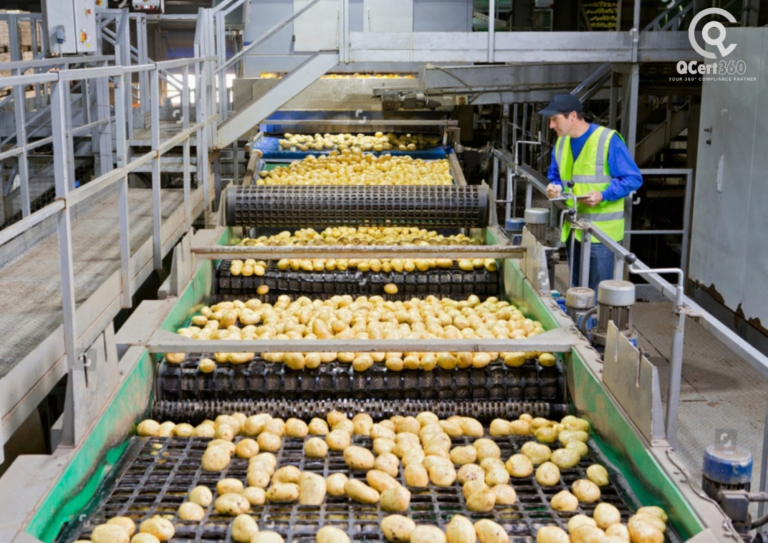
Here’s the thing: if you’re an organic food producer in Portugal or Sweden trying to export to high-standard markets in the EU or beyond, safety isn’t just a good practice — it’s a deal-breaker. Buyers, regulators, and consumers want proof that your organic product is clean, traceable, and produced under strict controls. And that’s where ISO 22000 certification for organic farms in Portugal and ISO certification for organic food producers in Sweden becomes more than just a checkbox — it’s your passport to new markets.
This isn’t about greenwashing or jumping on the sustainability trend. It’s about real food safety systems that work. Organic food has its own challenges: no synthetic preservatives, limited shelf life, high spoilage risk, and growing scrutiny from eco-conscious regulators. ISO 22000 fills the gap — helping you build a systematic food safety management system that works for organic operations.
Let’s break it down.
What is ISO 22000?
ISO 22000 is an international standard for food safety management systems (FSMS). It helps you identify, control, and prevent food safety hazards across your entire supply chain. Unlike generic food safety systems, ISO 22000 is built to integrate with existing organic certification schemes and can work alongside HACCP certification for organic farms in Sweden or FSSC 22000 for organic food businesses in Portugal.
For small-scale producers and exporters in Portugal and Sweden, ISO 22000 offers structure, confidence, and global recognition.
Why Organic Producers in Portugal Are Adopting ISO 22000
Portugal’s organic sector is booming, especially in categories like olive oil, fruits, nuts, and artisanal grains. But here’s the challenge: local certification alone isn’t enough to satisfy importers in Germany, France, or Scandinavia.
Food safety certification for Portugal’s organic exports is now a key topic in trade discussions. To meet Portugal organic food safety standards, producers are turning to ISO 22000 to show they go beyond basic hygiene — they’re operating at a globally recognized level of control.
ISO 22000 helps with:
- Building traceability systems
- Managing allergen risks (critical for niche organic products)
- Reducing recalls and spoilage
- Making audits easier for EU buyers
If you’re producing for export, especially under EU organic export compliance regulations, ISO 22000 puts you in the league of trusted suppliers.
Why Sweden’s Organic Producers Can’t Ignore ISO 22000
Sweden is already known for its high food safety standards. But the rise of small-batch organic producers — from plant-based products to regenerative livestock farms — has introduced new complexity.
Buyers are asking questions like:
- How do you verify your feed supply chain?
- What’s your allergen management protocol?
- Can your packaging process be traced back?
ISO certification for organic food producers in Sweden answers these questions — not just with documents, but with audited systems. Even small businesses are getting ahead by pursuing Sweden ISO certification for small food businesses to stand out in a saturated market.
If you’re in Sweden and planning to export to Germany, the UK, or outside the EU, how to get ISO 22000 certified in Sweden is a question worth tackling now — not later when a buyer walks away.
How ISO 22000 Works for Organic Farms
Let’s say you’re running an organic berry farm in Portugal or an oat-based startup in Sweden. Your product is clean, pesticide-free, and certified organic. But can you prove your water source is regularly tested? That your cold chain is reliable? That your labeling is allergen-compliant?
ISO 22000 covers exactly that.
It builds on HACCP principles, which are mandatory in the EU but expands them with:
- Risk-based thinking across the whole supply chain
- Stakeholder communication and feedback loops
- Documented procedures for crisis management and food fraud
This is where ISO for sustainable agriculture in Sweden and Portugal fits in. It’s not about ticking boxes — it’s about building long-term resilience.
Benefits of ISO 9001 for Malaysian Manufacturing SMEs
Let’s zoom in on the specific advantages of SME ISO certification in Malaysia, especially for manufacturing companies:
- Market Access
ISO 9001 is your passport to both local and global markets. Government buyers look for it. So do MNCs and export clients. - Improved Process Efficiency
It’s not just a document exercise. ISO helps reduce waste, improve internal coordination, and cut rework—boosting margins. - Tender Eligibility
Many tender requirements for Malaysian manufacturers explicitly include ISO 9001. Without it, you’re filtered out automatically. - Customer Confidence
Whether it’s a GLC or a global buyer, ISO 9001 tells them you’re serious about quality. - Audit Trail and Compliance
ISO 9001 gives you the structure to maintain clean records and perform internal audits—an asset in highly regulated environments.
Getting Started: ISO 22000 in Portugal and Sweden
Here’s what the journey typically looks like:
- Gap Assessment
A consultant evaluates how your current operations match ISO 22000 requirements. This step is crucial for aligning with Portugal’s organic food safety standards or Sweden’s ISO requirements for food businesses. - System Design and Implementation
You build internal procedures — covering production, packaging, logistics, sanitation, and more. - Internal Audit
Before the final audit, you run an internal check to fix gaps. ISO 22000 consultants in Sweden or Portugal-based experts can guide this step. - Certification Audit
A third-party auditor visits your site. Once certified, you’re officially aligned with ISO 22000 for EU organic exporters.
Why Combine ISO with Organic Certification?
You might already have your organic certification through local or EU-recognized schemes. So why bother with ISO?
Because buyers now expect layered assurance. Organic tells them your inputs are clean. ISO 22000 tells them your process is safe. Together, they:
- Open more retail and private label contracts
- Reduce risk of recalls
- Make cross-border compliance smoother
- Help you access grants and sustainability funding
The Role of Consultants: Portugal and Sweden
Getting ISO-certified isn’t a solo mission. For most producers, working with a specialized partner makes the difference between a smooth audit and a failed one.
If you’re based in Sweden, look for ISO 22000 consultants in Sweden who have food industry experience, especially in organics or plant-based products. In Portugal, regional consultants who understand both food safety certification and local organic regulations can help reduce audit stress and documentation errors.
Challenges to Watch For
Let’s be real — ISO 22000 isn’t plug-and-play.
Here’s what producers in both countries usually struggle with:
- Aligning documentation with organic rules (no synthetic inputs, special cleaning agents, etc.)
- Training seasonal workers
- Proving traceability for wild or semi-wild organic products
- Managing cross-contamination risks in shared facilities
This is where guidance on ISO 22000 for organic farms in Portugal or HACCP alignment for Swedish organic producers is gold.
What’s Next for Exporters?
If your growth depends on export — especially to premium markets like Scandinavia, the UK, or North America — it’s no longer a question of “should we?” It’s “when do we start?”
Whether you’re a vineyard in Portugal or a vegan cheese startup in Sweden, ISO 22000 certification is how you turn good organic products into market-ready, high-trust brands.
How Qcert360 Helps Organic Producers Get ISO 22000 Certified
Getting ISO 22000 certified in Sweden or Portugal is a strategic move—but it can be overwhelming without the right partner. That’s where Qcert360 comes in.
We work closely with organic food producers in Portugal and Sweden to simplify the certification journey from start to finish. Whether you’re a small-scale olive oil exporter in Alentejo or an organic dairy cooperative in Skåne, we tailor our support to your scale, sector, and supply chain.
Here’s what Qcert360 brings to the table:
- Local market understanding in both Portugal and Sweden
- Audit-ready documentation aligned with EU regulations and ISO 22000 clauses
- Practical guidance on hazard control, traceability, and PRPs
- Support with buyer and retailer expectations—especially if you’re targeting export markets like Germany or France
- Fast-tracked certification timelines without shortcuts
We don’t just help you get certified—we help you build a food safety culture that buyers trust and your team can sustain.
FAQs
- What is ISO 22000, and how is it different from HACCP?
ISO 22000 is a full food safety management system standard, whereas HACCP is a risk assessment tool. ISO includes HACCP but goes further with system-wide control. - Do I need both organic certification and ISO 22000?
Yes, if you’re exporting. Organic covers your inputs; ISO 22000 covers your food safety processes. - How long does ISO 22000 certification take in Portugal or Sweden?
Typically 3–6 months, depending on your current systems and consultant support. - What’s the cost of ISO 22000 certification for a small organic farm?
Cost varies, depending on size and complexity & type of service required. Government support may be available. - Is ISO 22000 recognized across the EU?
Yes. It’s an internationally recognized standard accepted by retailers, regulators, and buyers across the EU. - Can I use ISO 22000 for local sales too?
Definitely. It improves your internal efficiency and reputation even in domestic markets. - Are there ISO 22000 consultants specialized in organic food?
Yes, especially in Sweden and Portugal. Look for consultants with experience in organic supply chains. - What documents are required for ISO 22000 certification?
Process manuals, hazard analyses, traceability logs, cleaning records, and employee training records are core. - Does ISO 22000 help with sustainability compliance?
Yes. It supports sustainable practices through resource monitoring and risk management systems. - Can ISO 22000 certification be combined with FSSC 22000 or other food standards?
Yes. It’s often part of an integrated food safety strategy with FSSC 22000, BRC, or even ISO 9001.


